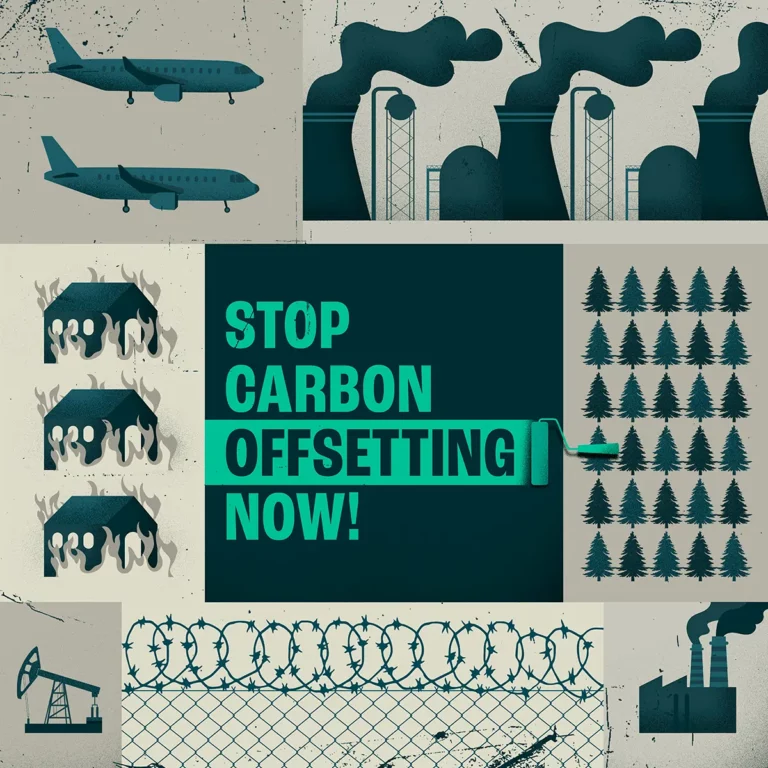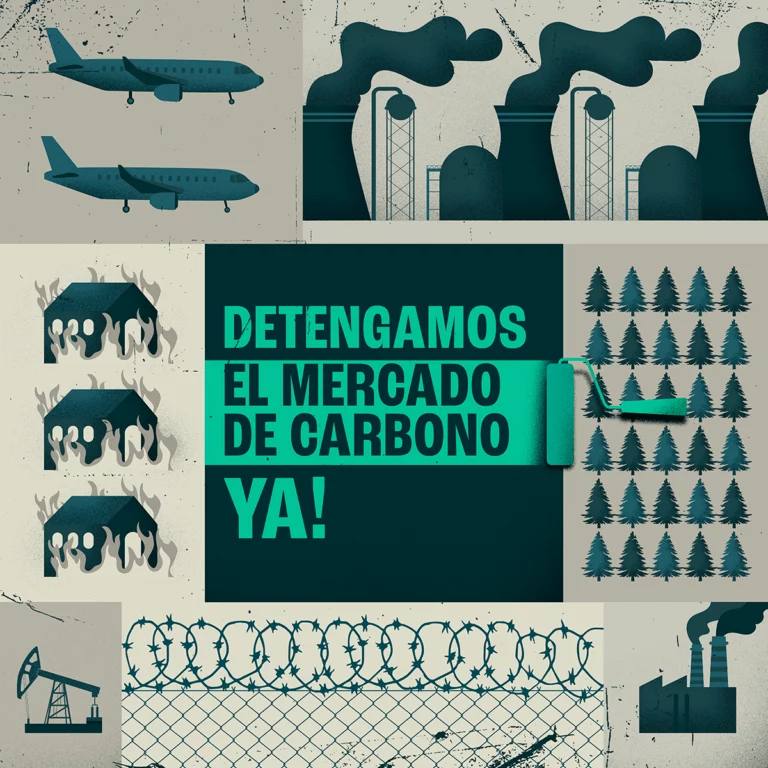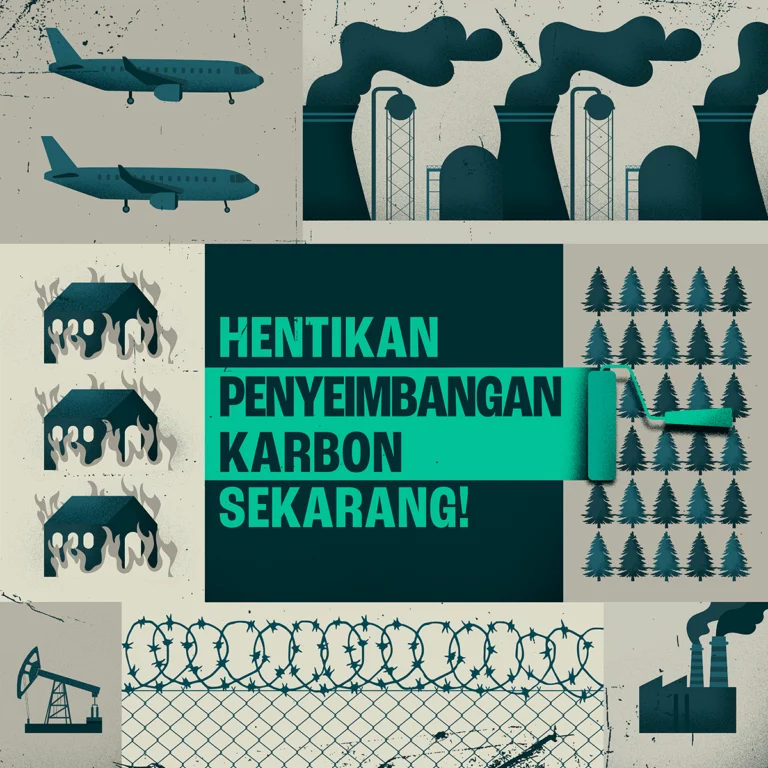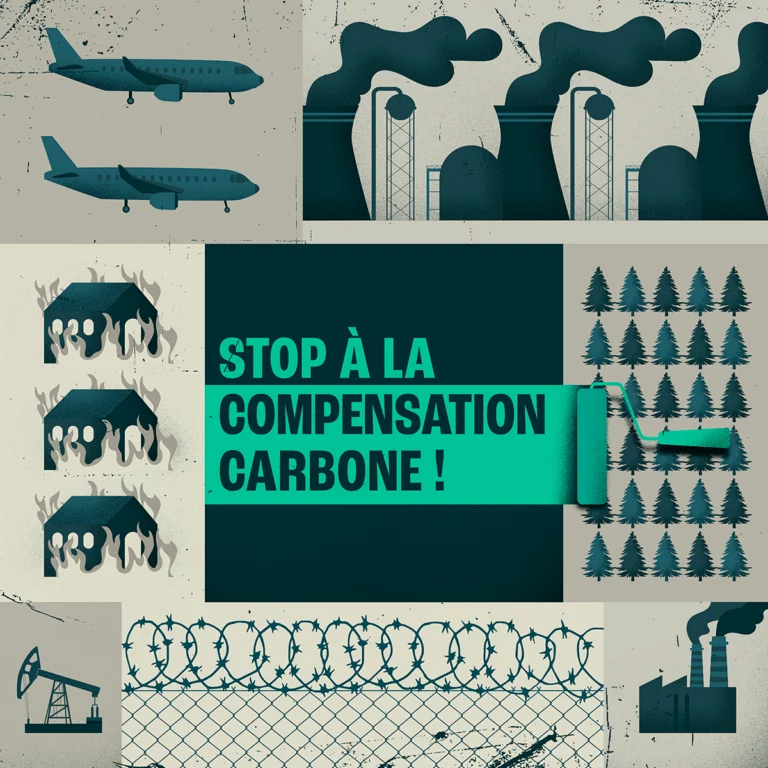




Collective press release: Stop carbon offsetting now!
Stop carbon offsetting now!
Press release, 4 December 2023 – Carbon offsetting has undermined real climate action, given rise to human rights and Indigenous rights violations and caused severe harm to frontline communities for over two decades. Despite this, the UN climate conference (COP28) currently underway in the United Arab Emirates is set to be one of the biggest promotional events for carbon offsets ever. In the coming week, governments will decide on whether to operationalise carbon offsets in international climate policy and the UAE presidency will hold numerous promotional thematic events.
The fraud and harms to local communities caused by carbon market projects have been thoroughly documented. Throughout 2023, academic research, media and civil society investigations have exposed how these projects routinely generate phantom offsets and result in land grabbing and human and Indigenous rights violations (see below). Recent examples include the forced relocation of Ogiek Peoples in Kenya’s Mau Forest to make way for carbon offset projects and the extensive sexual abuse at a Kenyan offset project operated by Wildlife Works of the US. Over the past months, Kenya, along with Liberia, Tanzania, Zambia and Zimbabwe, have signed deals with Dubai-based Blue Carbon covering a total of over 24 million hectares of community lands.
The new frontiers for carbon offsetting are based on a race to convert agricultural soils and coastal and marine areas into carbon “removals” that are alleged by companies to sequester carbon and generate “new” carbon credits. None of these techniques are proven to permanently store carbon. Large scale industrial seaweed cultivation is, for instance, infringing the territories of coastal communities and creating new threats to the marine environment and the marine food web.
Carbon offsetting has also given rise to a rapidly growing industry of risky geoengineering and climate chaos profiteers, often to the detriment of local and Indigenous communities. Carbon offset project developers, standards bodies, auditors and credit providers have pocketed millions from churning out carbon credits that have failed to reduce emissions and exacerbated the climate crisis. These projects, many of which are repackaged as so-called ‘nature based solutions’ or ‘natural climate solutions’ or, when done at coastal and marine areas, as ‘blue carbon,’ have also drawn peasant and Indigenous communities into costly and complicated legal battles in their effort to affirm their rights and reclaim community territories and in their fights to resist the projects. In the Cordillera Azul National Park REDD project (PNCAZ), Kichwa communities in the Peruvian Amazon have been impacted by these costly schemes. The Katingan Peatland Restoration and Conservation Project in Indonesia is also negatively impacting Dayak communities. Total Energies ‘nature-based solution’ involving tree plantations for offsetting in the Republic of Congo’s Bateke Plateau, home to Aka Indigenous communities and Bantu farmers, is another case of offsetting in which community rights are being violated. As these projects continue centuries-old dispossessions, now with “green” justifications, they amount to green grabbing colonialism.
Carbon markets are not a solution for climate change. What is urgently needed is renewed focus on keeping fossil fuels in the ground and commitments to real climate action based on equity and justice.
QUOTES
Jutta Kill, World Rainforest Movement said, “Carbon offset trading is reckless and irresponsible. Far too much time has been wasted on attempts to fix a concept that is structurally flawed. Far too many projects have led to land grabbing and caused conflict and harm to peasants, Indigenous peoples and communities.”
Shalmali Guttal Focus on the Global South said, “Organizations of small-scale fishers, coastal and inland communities have unequivocally rejected the so called ‘Blue Economy’ and pointed out how concepts of sustainability and resilience are being subverted to advance ‘climate colonization’ with expanding frontiers of extraction and exploitation of nature.”
Kirtana Chandrasekaran, Friends of the Earth International said, “Carbon markets fuel green grabbing by big polluters. Yet at COP 28 Governments will decide on whether to expand the scope of carbon markets to include new lands, seas and new types of risky offset activities. This would be a disaster for the climate and frontline communities. What we need are real emissions reductions and real climate finance. Anything less is failure.”
Devlin Kuyek from GRAIN said, “Carbon markets, offsets schemes, and carbon “removals” cannot offer solutions to the climate crisis. They prop up a system that has enabled corporate polluters and rich countries to delay action and profit from the crisis. Whether unregulated or with a UN seal of approval, carbon offsetting in all its shapes and forms, including REDD or so-called “nature-based solutions” and “blue carbon”, is a fraud that must be immediately scrapped.”
Laura Dunn, ETC Group said “In the carbon offset world, seaweed is touted as the new “green” oil. But our recent report The Seaweed Delusion shows that industrial seaweed farming won’t save our climate or save nature. Geoengineering the planet with massive seaweed plantations will destroy ecosystems and threaten coastal communities.”
Anuradha Mittal, Executive Director of the Oakland Institute: “At COP28, world leaders and climate negotiators need to recognize once and for all that carbon markets are a failed source of climate finance. They are volatile and unstable, marked by fraud, incapable of reducing emissions, and actually harm communities. We cannot afford to waste any more time on this false solution. The world urgently needs alternative ways to drive climate action, because carbon markets have failed.”
Jose Bravo of Just Transition Alliance said: “Pollution trading and offset schemes have only served to line the coffers of the world’s largest polluting corporations. To regain any credibility following this COP 28 facade, the UNFCCC needs to move away from such polluter subsidies and start following the leadership of frontline workers and communities who are forging just transition pathways based on real climate solutions.”
Tom Goldtooth, Executive Director of the Indigenous Environmental Network, said: “A global phase out of fossil fuels at source should be priority at this UN conference on climate, not more carbon markets, offsets, pricing and removals. Article 6 of the Paris Agreement gives a free pass to polluters and Indigenous Peoples are disproportionately impacted by these false solutions, fossil fuel industry extraction and the increasing impacts of climate change. More carbon markets, offsets and removals must not be considered as solutions. Over 20 years of history with offsets have resulted in the rights of Indigenous Peoples being violated, increased land grabbing, and disproportionate impacts on Indigenous environmental defenders. The false solutions will become a crime against humanity and Mother Earth.”
–ends–
NOTES
Some examples of harm to local communities from carbon offset projects:
-Nearly half of the offsets purchased by Chevron are linked to claims or allegations of inflicting harm on communities and spurring degradation of ecosystems, particularly in the Global South or on the climate crisis frontlines
– A global map of carbon offset projects from the past five years shows 72% causing harm to Indigenous or local communities.
– A refuse-derived fuel project in Kerala, India, set up to generate carbon credits, is poisoning the air of the densely populated surrounding villages
– Total’s offsetting project in the Republic of Congo has taken land from farmers and threatens their livelihoods
-Communities living within the Alto Mayo REDD+ project in Peru were violently evicted from their homes in a series of clearances by park authorities.
-The African Forestry Impact Platform recently acquired Green Resources, a Norwegian plantation forestry and carbon credit company with a history of land grabbing, human rights violations, and environmental destruction across Uganda, Mozambique, and Tanzania.
Some examples of fraud and trade in phantom credits:
– Described as a “Cash-for-Carbon Hustle” by the New Yorker, South Pole’s Kariba REDD project in Zimbabwe raised at least $100 million in carbon credits before collapsing in scandal in October 2023.
– A 2023 study found that the majority of the world’s leading carbon offset projects could be categorized as “likely junk”, while another, looking at the world’s leading carbon offset certifier, found that “most credits probably don’t represent any climate benefit.”
– A study by Mongabay and the New Humanitarian found that the UN’s carbon neutrality claims rely largely on carbon offset credits that do little to reduce greenhouse gas emissions, some of which have been tied to reports of environmental damage, displacement, or health problems.
– An assessment of the Northern Kenya Grassland Carbon Project, run by the Northern Rangelands Trust (NRT), found it relies on flawed methodological assumptions, calling into question the credibility of the offsets it generates.
– An investigation by Le Monde found that three carbon offsetting projects in Portel, Brazil – which have sold credits to Air France, Boeing, Bayer, Veolia, LCL, and Samsung – are fraudulent and have no climate benefits.
– In Papua New Guinea, an investigation by ABC found evidence of commercial logging happening in a rainforest meant to be protected by a carbon credit scheme run by US-based company NIHT.
– A publication from the US-based Penn Center for Science, Sustainability and the Media concludes that carbon offsets undermine the UN Paris Agreement.
– Research by the former offset provider Compensate suggests that credits from the majority of the more than 170 screened ‘nature-based’ offset projects that are sold on markets are “unsuitable for offset use.”
– Based on their own analysis, the offset rating agency BeZero noted that while “[t]he theory of carbon markets assumes that all credits represent emissions avoidance or removal equal to 1 tCO₂e … evidence increasingly shows that this is not the case.”
Organisations:
Global Justice Ecology Project, North America/International
Friends of the Earth International
GRAIN
ETC Group
Focus on the Global South
World Rainforest Movement
A Growing Culture
The Oakland Institute
Indigenous Environmental Network
Media contacts:
Friends of the Earth International: Madeleine Race, communications officer, [email protected], +31 645 198 654 (EN, FR, ESP)
GRAIN (agriculture/food): Ange David Baimey, [email protected], +22505345274, Côte d’Ivoire (EN,FR)
Focus on the Global South: Shalmali Guttal, [email protected]. India and Thailand. +918971368696.
ETC group (geoengineering, carbon removals ): Laura Dunn, [email protected] +1 514-607-9979 (EN)
The Oakland Institute: Anuradha Mittal [email protected] +1 510 469 5228
Indigenous Climate Action: ATTN: Katie Wilson & Rosalyn Boucha, [email protected] (EN)
Indigenous Environmental Network (IEN): Daisee Francour, Communications Director, [email protected] +1 415 312 5958 [EN]